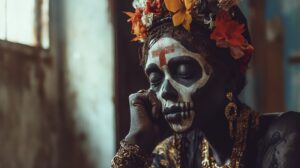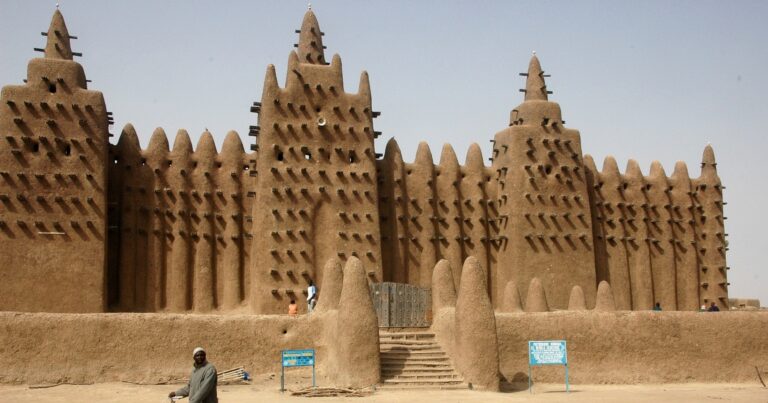
The Yoruba tribe is one of the largest and most influential ethnic groups in Africa, with a rich cultural heritage.
Predominantly located in southwestern Nigeria, the Yoruba people also have a presence in Benin and Togo.
Their culture has significantly shaped the history, politics, and cultural landscape of West Africa and continues to be an influential force worldwide.
Let’s talk about them.
1. Mythological Ancestry
Yoruba mythology claims that the people are descendants of Oduduwa, the deity considered the progenitor of the race.
According to the myth, Oduduwa descended from the heavens with a chain to create the first Yoruba kingdom, Ile-Ife.
The city remains sacred and is regarded as the spiritual center of the Yoruba people. The divine connection between them and their mythological ancestry reinforces their strong sense of identity and cultural pride.
- Oduduwa: the founding figure in Yoruba myth.
- Ile-Ife: regarded as the birthplace of the Yoruba civilization.
- Cultural Identity: the myth strengthens communal ties and traditional beliefs.
2. The Largest Twin-Bearing Ethnic Group
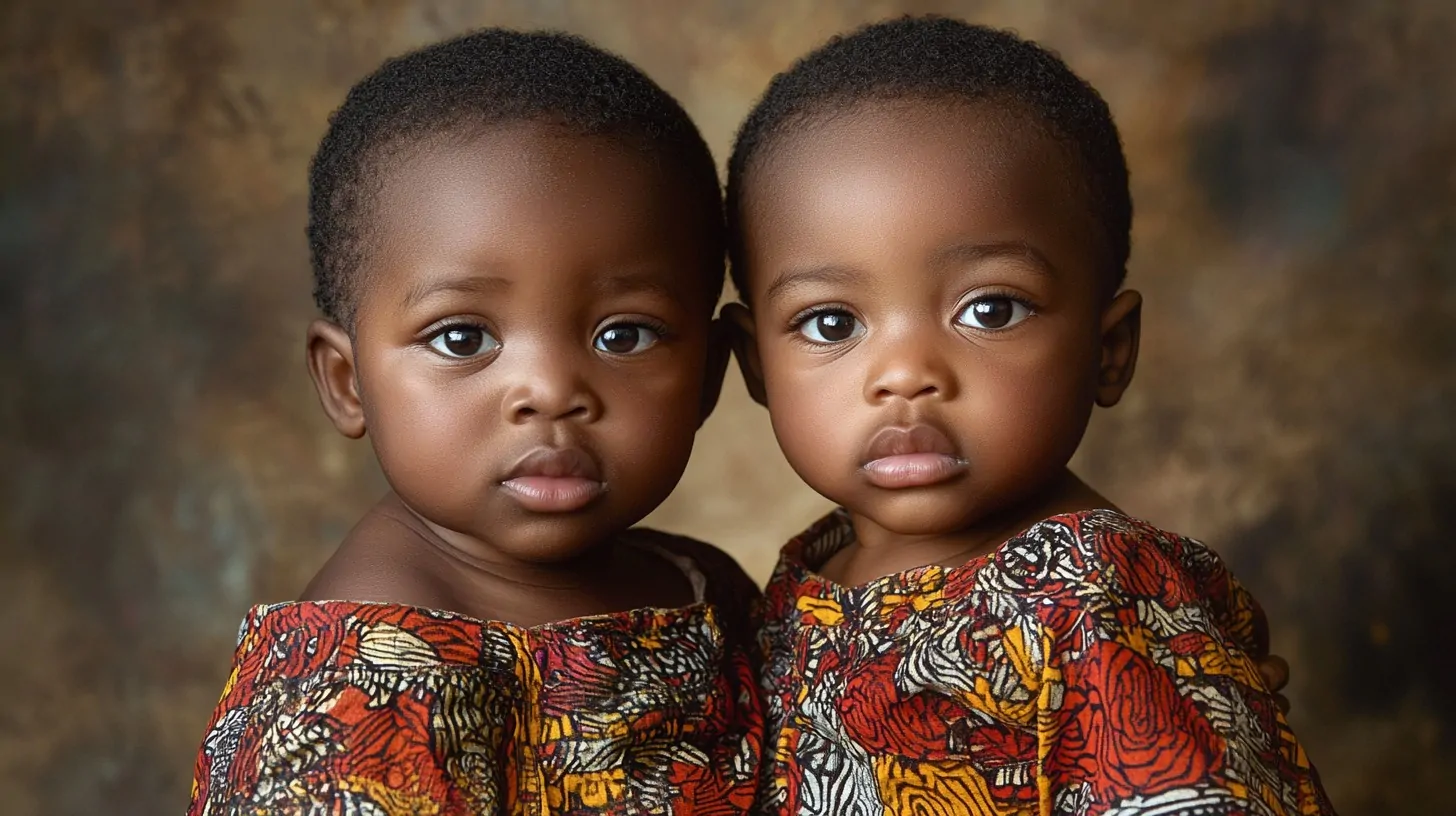
The Yoruba people hold the world’s highest rate of twin births, and twins are viewed as special and blessed, 4.4%, according to the report by Cambridge University.
The high incidence of twin births is often linked to dietary factors, especially the consumption of yams, a staple in the local diet.
Twins are celebrated in culture through specific rituals and naming traditions, often viewed as a good omen and a sign of prosperity.
- Twin Celebrations: twins are honored through rituals and festivals.
- Naming Tradition: twins are given special names like Taiwo and Kehinde.
- Dietary Influence: yam consumption is believed to contribute to higher twin birth rates.
3. Language and Dialects
The Yoruba language, belonging to the Niger-Congo family, is spoken by over 50 million people globally.
Despite the variety of dialects such as Ekiti, Ijesha, and Egba, most speakers can communicate effectively with one another.
Yoruba is rich in proverbs, idioms, and a deep oral tradition that plays a crucial role in the transmission of cultural values and philosophies.
- Dialect Diversity: multiple dialects, but mutual intelligibility remains high.
- Proverbs: central to communication, emphasizing wisdom and community.
- Global Reach: over 50 million native speakers across the world.
4. Historical Homeland
The Yoruba homeland encompasses southwestern Nigeria, extending into parts of Benin and Togo, with a population exceeding 60 million.
The land is marked by diverse geography, from coastal areas to savannas, supporting a robust agricultural tradition and urban development.
Major cities like Lagos and Ibadan have become important political and economic centers in West Africa.
- Geography: diverse, with coastal areas and savannas.
- Urbanization: cities like Lagos are significant urban centers.
- Population: over 60 million people, mostly concentrated in Nigeria.
5. Traditional Religions
About 20% of Yoruba people still practice their traditional religion, which is polytheistic and revolves around the worship of deities known as Orishas.
Olorun, the supreme god, is regarded as the creator, while other deities such as Ogun (the god of iron and war) and Eshu (the trickster god) play important roles in daily life.
These religious beliefs are often combined with Christianity or Islam, creating a unique blend of religious practices.
- Polytheistic Beliefs: worship of multiple deities (Orishas).
- Olorun: supreme deity and creator.
- Religious Syncretism: the blending of traditional beliefs with Christianity and Islam.
We must say that the Yoruba people had a hand in the development of Voodoo and Hoodoo as well.
6. Festivals and Celebrations
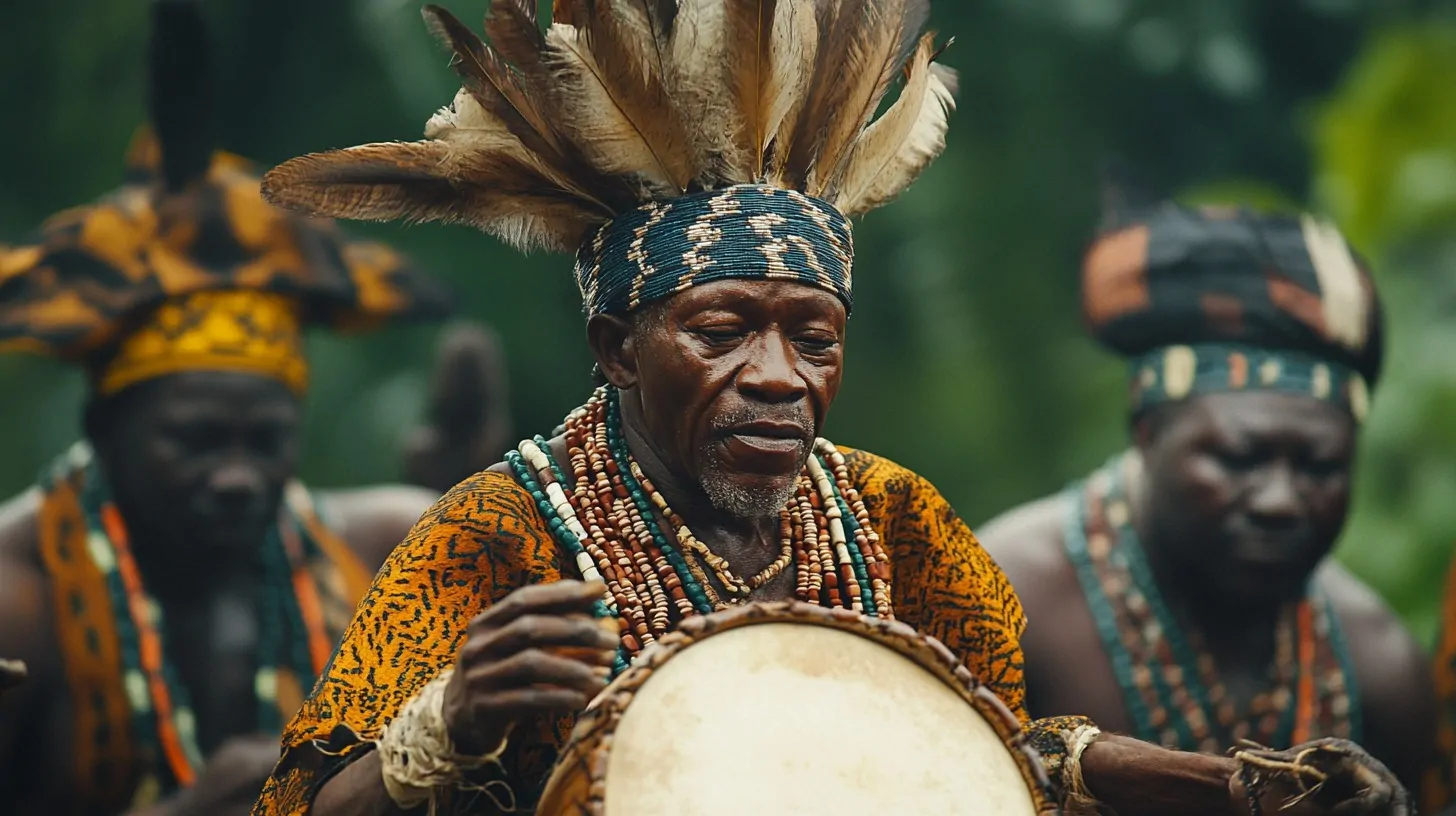
Yoruba festivals are vibrant displays of culture, color, and community.
Major life events, including weddings, funerals, and housewarmings, are celebrated with elaborate ceremonies that involve traditional attire, music, and dancing.
The Eyo Festival, a cultural event in Lagos, is one of the most famous festivals, symbolizing the passage of life and honoring the ancestors.
- Eyo Festival: one of the largest celebrations, especially in Lagos.
- Traditional Attire: colorful garments worn during celebrations.
- Cultural Significance: festivals reflect the communal and spiritual importance of major life events.
7. The Influence of Folktales
Folktales in Yoruba culture carry significant weight, often serving as moral instruction for younger generations.
These stories, filled with characters like the trickster Tortoise, reflect their core values, such as respect for elders, the importance of community, and the balance between good and evil.
Folktales are typically told orally, passed down through generations to preserve cultural heritage.
- Moral Lessons: stories often provide ethical teachings.
- Oral Tradition: central to preserving Yoruba history and culture.
- Iconic Characters: trickster figures like Tortoise offer lessons in wit and caution.
8. Urbanized Living

The Yoruba people are among the most urbanized in Africa, with cities like Lagos, Ibadan, and Abeokuta being major hubs of commerce, culture, and industry.
Lagos, the largest city in Nigeria, is not only the economic heart of the country but also a cultural epicenter.
Despite this urbanization, many communities retain their traditional customs and values.
- Lagos: one of Africa’s largest cities and a major economic hub.
- Urbanization: a long history of city-building and commerce.
- Cultural Preservation: urban dwellers often maintain strong ties to traditional practices.
9. Names and Their Significance
In Yoruba culture, names hold profound importance and are believed to influence a person’s destiny.
Yoruba children are given names that reflect the circumstances of their birth, familial aspirations, or religious beliefs.
Special names are also given to twins, with Taiwo meaning “the first to taste the world” and Kehinde meaning “the one who comes after.”
- Destiny and Identity: names are thought to shape a person’s future.
- Twin Names: Taiwo and Kehinde for twins.
- Circumstantial Names: often reflecting birth events or parental hopes.
10. Prominent Historical Figures
Yoruba history is filled with remarkable figures who have made significant contributions to various fields. Among these are Nathaniel Thomas King, Nigeria’s first medical doctor, and Wole Soyinka, the first African to win the Nobel Prize in Literature.
These individuals have played a key role in advancing the Yoruba legacy both in Nigeria and on the global stage.
- Nathaniel Thomas King: Nigeria’s first medical doctor.
- Wole Soyinka: Nobel Laureate in Literature.
- Historical Impact: notable figures in medicine, literature, and beyond.
11. Role in Nigerian History
The Yoruba people have played a vital role in shaping Nigerian history, particularly in politics and governance. The first political party in Nigeria, the Nigerian National Democratic Party (NNDP), was founded by a Yoruba leader, Herbert Macaulay, in 1923.
They were also key players in the fight for Nigeria’s independence and have consistently held significant positions in Nigerian political life. Their influence extends into modern politics, contributing to the shaping of Nigeria’s contemporary governance structure.
- First Political Party: NNDP, founded by Herbert Macaulay.
- Independence Movement: active participants in Nigeria’s push for freedom.
- Political Influence: Yoruba leaders have held important roles throughout Nigeria’s history.
12. The Local Cuisine
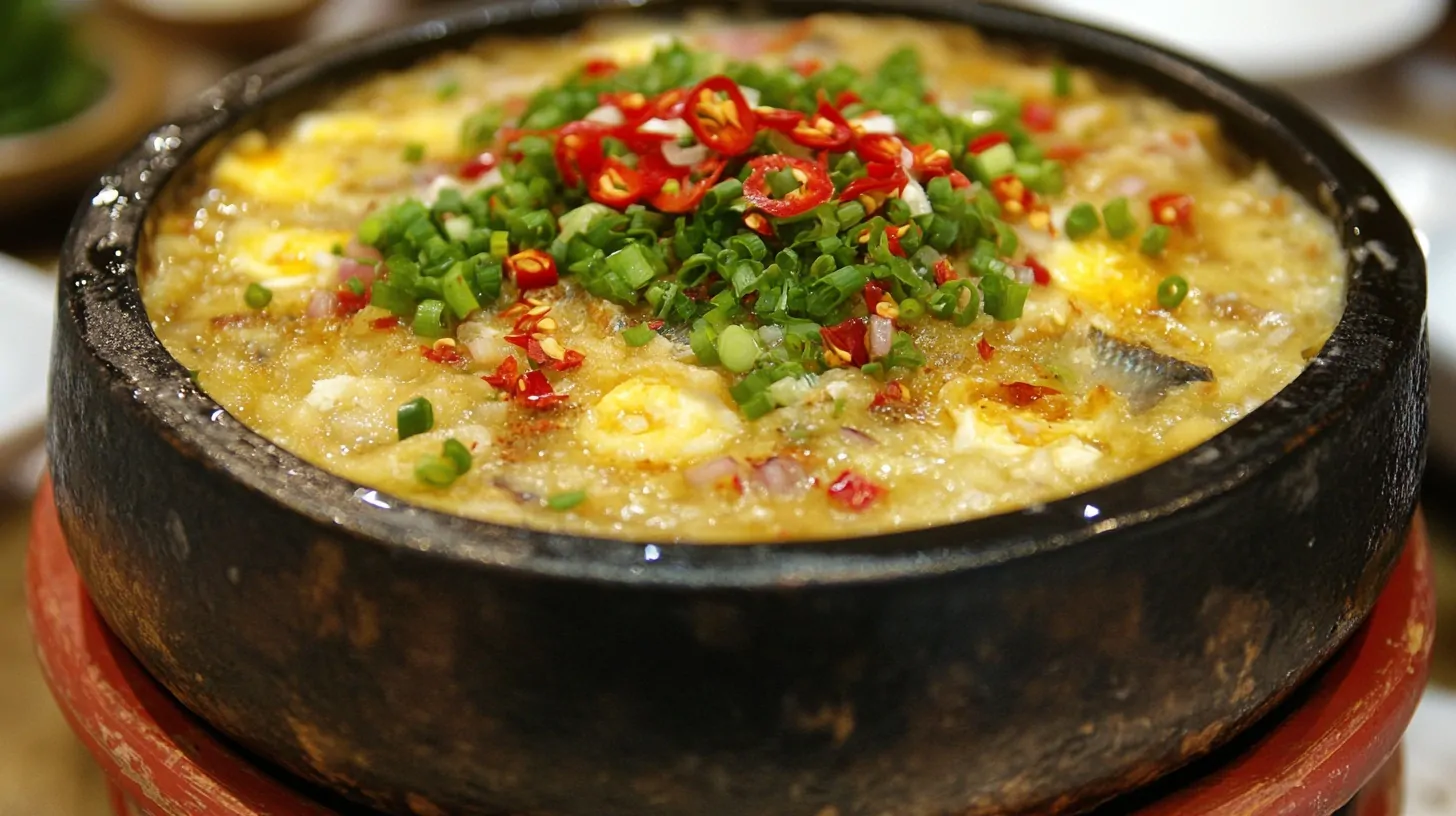
Yoruba cuisine is an essential part of their cultural identity, with a range of dishes that highlight the use of yams, plantains, and various grains. Popular dishes include moin-moin (a steamed bean pudding), amala (a yam flour dish), and jollof rice, which is enjoyed across West Africa.
Yoruba food is known for its rich flavors, often enhanced by local spices like pepper and ginger, and the communal nature of meals reflects the importance of family and togetherness.
- Popular Dishes: moin-moin, amala, and jollof rice.
- Flavors: bold use of spices like pepper and ginger.
- Communal Meals: food as a symbol of unity and family bonds.
13. Farming Traditions
Agriculture has long been a pillar of Yoruba society, with about 75% of men historically engaged in farming.
Yams are the staple crop, but maize, cassava, and cocoa are also widely grown.
Farming practices are deeply intertwined with the seasons and traditional religious beliefs, with annual festivals marking planting and harvest periods.
Farming is not just an economic activity but also a cultural tradition passed down through generations.
- Staple Crops: yams, maize, cassava, and cocoa.
- Cultural Significance: farming practices tied to religious festivals.
- Traditional Practices: farming knowledge passed down through families.
14. First Television Station in Africa
The Yoruba made history in 1959 when the first television station in Africa, Western Nigeria Television (WNTV), was established in Ibadan. This achievement placed Nigeria at the forefront of media development on the continent and marked a significant moment in African broadcasting history.
The station played a key role in spreading the culture through televised plays, news, and educational programming, contributing to the cultural and intellectual growth of the region.
- WNTV: the first television station in Africa, founded in 1959.
- Cultural Influence: promoting Yoruba plays and cultural programs.
- Educational Impact: contributed to the dissemination of information and education.
15. Nigeria’s First University
The University of Ibadan, founded in 1948 in Yoruba land, is Nigeria’s first university. It began as a college of the University of London and has since evolved into one of the most prestigious educational institutions in Africa.
The university has produced numerous notable graduates who have gone on to become leaders in fields such as politics, literature, science, and education.
- Founding Year: established in 1948.
- Prestigious Alumni: graduates have become influential figures in various fields.
- Academic Influence: a leading institution for higher learning in Nigeria.
16. Early Lawyers and Professionals

The Yoruba have a long history of producing Nigeria’s first professionals in fields such as law and medicine. Chief Sapara Williams was the first Nigerian to qualify as a lawyer in 1879, and Stella Thomas was the first Nigerian female lawyer.
These trailblazers not only paved the way for future generations but also contributed significantly to the development of the legal and professional sectors in Nigeria.
- Chief Sapara Williams: Nigeria’s first lawyer, qualified in 1879.
- Stella Thomas: Nigeria’s first female lawyer.
- Pioneers: significant figures in the legal and professional development of Nigeria.
17. Art and Theater
The Yoruba people are renowned for their contributions to the world of art and theater. Yoruba art, particularly their woodcarving and bronze sculptures, reflects their deep connection to spirituality and tradition.
In the theater world, Chief Hubert Ogunde is regarded as the father of Nigerian theater, having pioneered modern theater through his innovative plays that blend music, dance, and drama. Yoruba theater continues to inspire and influence contemporary Nigerian art.
- Woodcarving and Sculpture: traditional forms of artistic expression.
- Hubert Ogunde: father of Nigerian theater.
- Influence on Contemporary Art: Yoruba theater and art shape modern Nigerian culture.
18. Philosophy of Life and Death

The Yoruba believe in a cyclical understanding of life and death, with a strong emphasis on the afterlife. Ancestors are revered, and it is believed that they continue to influence the lives of their descendants.
They also believe in reincarnation, with the idea that souls return to Earth to continue their journey.
This philosophy shapes many of the cultural and religious practices observed in Yoruba communities, from funerals to daily life.
- Reincarnation: belief in the soul’s return to earth.
- Ancestral Worship: ancestors are venerated and seen as guiding figures.
- Cyclical View: life and death are interconnected in Yoruba philosophy.
19. Industrial Hub of Nigeria
The Yoruba homeland, particularly Lagos, serves as the industrial hub of Nigeria, housing over 70% of the country’s industrial capacity. Lagos, one of the fastest-growing cities in the world, is the center of Nigeria’s financial and economic activities.
The region’s industrial growth has been instrumental in transforming Nigeria into one of Africa’s largest economies, with sectors such as manufacturing, finance, and oil playing key roles.
- Lagos: the industrial and financial center of Nigeria.
- Industrial Growth: over 70% of Nigeria’s industrial capacity is located in Yoruba land.
- Economic Importance: a key contributor to Nigeria’s position as a leading African economy.
20. Contribution to Literature and Music

Yoruba people have made significant contributions to both literature and music, with early pioneers like Canon Josiah Jesse Ransome-Kuti, who released Nigeria’s first music album in 1878.
In literature, the Yoruba have produced celebrated writers such as Wole Soyinka and Amos Tutuola, whose works have garnered international recognition.
Yoruba music, known for its rhythmic complexity and spiritual depth, continues to influence modern genres, from Afrobeat to global pop.
- Ransome-Kuti: released Nigeria’s first music album in 1878.
- Wole Soyinka: Nobel Laureate in Literature.
- Music: Yoruba rhythms have influenced Afrobeat and other global genres.
21. First Female Drivers
Mrs. Funmilayo Ransome-Kuti made history as the first woman to drive a car in Nigeria. She was not only a trailblazer in this regard but also an influential political leader and women’s rights activist.
Her accomplishments were pivotal in advancing the role of women in Nigerian society, challenging traditional gender roles, and promoting women’s rights.
- First Female Driver: Funmilayo Ransome-Kuti was Nigeria’s first woman to drive.
- Women’s Rights Activist: a leader in advocating for gender equality.
- Pioneering Role: challenged societal norms and promoted women’s participation in public life.
22. Twins in Sculpture
Twins hold special significance in culture, inspiring a rich tradition of twin-related art, particularly in wood sculptures known as ere ibeji. These sculptures are created to honor deceased twins and serve as spiritual vessels for their souls.
The Yoruba believe that twins possess unique spiritual powers, and their representation in art is a way of ensuring their continued presence and protection over their families.
- Ere Ibeji: sculptures created to honor deceased twins.
- Spiritual Significance: twins are believed to possess unique spiritual powers.
- Cultural Art: twin sculptures reflect Yoruba beliefs in the afterlife and family protection.
23. Influence on African and American Cultures
Yoruba culture has had a profound influence not only in Africa but also across the Americas, especially through the transatlantic slave trade.
Yoruba religious practices, music, and language have significantly shaped the cultures of countries like Brazil, Cuba, and Haiti, where Yoruba-derived religions like Santería and Candomblé are still practiced today.
The cultural exchange between the Yoruba people and the African diaspora has fostered a lasting legacy of resilience and cultural preservation.
- Transatlantic Influence: The culture spread through the slave trade.
- Santería and Candomblé: Yoruba-derived religions practiced in the Americas.
- Cultural Resilience: They have influenced African-American cultures, especially in music and spirituality.
24. The Role of Women

Yoruba women have historically held significant roles in their communities, from the home to the public sphere. They have been pioneers in medicine, law, and education.
Women like Funmilayo Ransome-Kuti fought for gender equality and political rights, while others have become influential figures in various sectors.
Yoruba women continue to play important roles in leadership, shaping the course of their society’s development.
- Funmilayo Ransome-Kuti: a key figure in women’s rights and political leadership.
- Pioneers in Professions: Yoruba women have been trailblazers in various fields.
- Leadership: women hold prominent positions in Yoruba society.
25. Rich Prehistoric History
Archaeological evidence suggests that the Yoruba people have lived in the region for thousands of years, contributing to the rich prehistoric history of Nigeria.
Findings from sites like Ile-Ife indicate that the Yoruba developed advanced societies with sophisticated artistry, trade networks, and religious structures long before European colonization.
These early settlements played a key role in shaping the history and culture of southern Nigeria.
- Ile-Ife: archaeological findings point to advanced ancient civilizations.
- Prehistoric Art: evidence of sophisticated artistry in early Yoruba settlements.
- Historical Impact: the Yoruba have shaped southern Nigeria for thousands of years.
The Bottom Line
The Yoruba tribe’s rich history, culture, and contributions have significantly shaped Nigeria and West Africa.
From pioneering television in Africa to influencing global culture, the Yoruba continue to leave a lasting legacy.
Their traditions, language, and philosophy remain integral parts of both African and global cultural landscapes.


